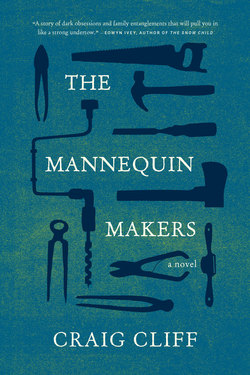Читать книгу The Mannequin Makers - Craig Cliff - Страница 19
ОглавлениеTwo nights until the window.
One thing I failed to mention yesterday regarding morning routine: every so often Father will teach us a new tableau to add to our repertoire. He moulds us, planting our feet in the correct spots, twisting our torsos, raising or lowering our chins. He will often stand there with his hand on my chest until he cannot detect my breathing. (As he is fond of saying, ‘If you can fool the hand you can fool the eye.’) He also instructs us on the characters of the tableau, the inner feelings we must transmit through our outward appearances. Our characters are not always happy siblings or young lovers. This morning Father taught us one of these more vexed tableaux. It will certainly be the last we learn before the window.
In the new tableau I am a respectable young socialite who has previously rejected Eugen because of his poor prospects, only for us to be reunited once he has made his fortune. Some of the story-telling can be conveyed by wardrobe (fine clothes in the newest fashion for Eugen, respectable gown for me) but for morning routine we pose unencumbered. As Father says, if a bare pose is convincing it can be enhanced by clothes, but nothing can save an unconvincing pose.
The first day of a new pose is always the hardest. It is taxing, both mentally and physically, but after so many years of morning and afternoon routines, we both look forward to the challenge.
It is always humbling (for me at least) to move from a perfected pose to a new one and learn that the stillness you had achieved so completely is not easily transferred. You must interrogate where each body part is positioned, which muscles are required to hold everything in place and where the cheats are: those parts of the body that are idle or obscured in the pose and thus require less attention. With time and much effort, and under Father’s watchful eye, Eugen and I have learnt to subtly rearrange our weight to draw on the untapped strength of these cheats without making any perceptible movements.
In the moments when I could disengage my mind this morning I pondered whether this would be the first tableau we use for the window, or if it was too great a risk to attempt it with only three days’ practice. I thought about the gown I might wear, something plush and feminine like the orange velvet dress Father brought home one night in October.
One positive aspect of the new tableau is that Eugen and I are facing each other. Sometimes, I am turned away (such as when I am the young maiden refusing a diamond ring, though my face must express that my heart will soon melt and I will turn around and accept) or Eugen’s back is to me (when we are farm hand and farmer’s daughter caught in a sunshower and running for the shelter of the barn). I must fix my gaze for the duration of the tableau and I much prefer to look upon Eugen’s face than his shoulder or a knotted rafter. Eugen is not much of a conversationalist in the traditional sense, but I treasure our silent exchanges when posing.
This morning as I looked into Eugen’s eyes his face contorted into a cold and satisfied expression. I was reminded of the scene where Edmond Dantès reappears before Mercédès, although he is now the Count of Monte Cristo and she the Countess de Morcerf. As I recalled the scene in greater detail, Eugen’s face began to resemble the vendetta-driven count’s all the more. If I were to walk up to him now as he plays ‘Fantasia in F minor’ (I can see the heading on the sheet music from here) and ask him about the scene he constructed around this morning’s tableau, I am certain it will match that of Dumas’ novel, though Eugen will not be able to give any of the correct names.
